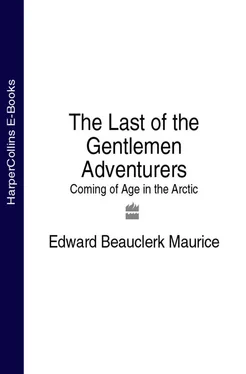1 ...6 7 8 10 11 12 ...22 After we had cleared up the mess and done the washing up, we gathered round an old piano that had been retrieved from a wreck along the coast. The manager played familiar tunes and we sang and laughed and played silly games until it was time to go back to the ship. When we tried to thank them for everything, they said that they hadn’t had such a happy evening for a long time and hoped that one day we might all come back.
Early the next morning we sailed from Makkovik to steam along the central part of the coastline. The scenery improved greatly. There were dozens of islands large and small, where the sea wound in and out in twisting passageways, curious-shaped cliffs and rocks, worn down by time and sea and weather. Birds of all coastal types abounded, from the hungry, cawing gull to the lively little arctic tern.
By the time we reached Hebron, a few days further down the coast, the land was even more impressive, as it rose high and rugged toward the desolate mountains. The weather was fine and sunny and a morning spent on deck was as good as anything an expensive cruise ship could offer.
I found Bill in a cozy spot one morning, behind some boxes, quite sheltered from the slight breeze. He smiled when he saw me.
‘So you tracked me down, eh?’ he said, but showed no reluctance to talk.
‘You wouldn’t think that a fine new ship was lying just beneath the water over there, would you? Not that she would be new now of course.’ He pointed over to the coast and continued.
‘The Bay Rupert . I don’t suppose you ever heard of her. The company had her built after the war. She was a fine ship, much larger than the Nascopie and everything brand spanking new. They put in special accommodation for bringing tourists up here. It was more like travelling on an Atlantic liner than coming up north.’
‘Did you ever sail in her?’ asked Ian.
‘I did indeed,’ said Bill. ‘I got off just before she went down. It seems that there’s a rock along the coast, somewhere hereabouts, which sticks up under the sea but doesn’t break water and there was no buoy there to mark the spot. We were coming along the inside passage in beautiful weather, just like today, with a pilot who was responsible for the navigation. The story was that one evening this man made out the course that they were to follow and the captain said that if he did as the pilot wanted, they would run smack into a rock about breakfast time next morning. Some people said that they had a great row about it, but that the course stayed as it was. The next morning, I was just getting out of my bunk when there was a terrific bump and, sure enough, the skipper was right. I’d never been shipwrecked before and it wasn’t anything like what I had thought it would be. We just got into the boats and they took us ashore, rather as if we were going for a day out, but the ship sank quite quickly and as the water isn’t very deep, it became a kind of treasure trove for all and sundry. Most of the homes along there have to thank the Bay Rupert for some item or another.’
‘What did they do to the pilot?’ I asked.
‘I don’t think that they actually did anything to anybody. There was a great deal of argument as to what had really happened and nobody seemed to know the whole story.’
‘It’s a good thing that it doesn’t happen very often up here,’ Ian said.
‘Oh, round about that time there was a jinx on the company,’ said Bill. ‘Another of the bay boats was lost, the Bay Chimo , but she didn’t sink, not at first anyway. She was trapped by the ice and it seems that she got frozen in during the winter, after they had abandoned her. Later on, she was sighted drifting about in the pack ice, like a sort of ghost ship, somewhere up in the Beaufort Sea, and for all I know she may still be held together by the ice of the Western Arctic!’
Almost as soon as we left Hebron the weather changed and during the night a thick fog closed about us. The captain groped his way at half speed, with frequent blasts of the fog horn, in case any of the wheat boats on their way to or from Churchill were in the vicinity.
We awoke in the morning to find the fog cleared and heard the rattle of the anchor chain going down, signifying our arrival at a post. When Ian and I went out on deck to see where we were, we did not at first believe that we had arrived anywhere. All we could see of the land was what resembled one humped black rock. Bill Ford put us right.
‘Port Burwell,’ he said, ‘and I hope that I never land here for my sins.’
We could see what he meant. This was one of the islands where the Labrador coast straggled off into the arctic seas. Bleak and inhospitable even on a summer’s day, one could well imagine that in the dark grey of the stormy winter the elements would combine to make life as unpleasant as possible.
For once there was little activity, and the dullness of the morning was only enlivened by the arrival of a boatload of Eskimos from the shore. They pulled alongside and one or two of their number came straight aboard the Ungava . The crew made them welcome, then the rest came pouring up the gangway, gabbling away to each other and beaming all over their brown faces. A few of the women wore red or green tartan shawls wrapped around their shoulders, but mainly they were clothed in parkas with deep hoods in which to carry their babies. Underneath they had on ordinary summer dresses made of coloured prints of various designs. Many of them looked as though they had got straight out of bed to come to the ship, and a few as though they had worn their clothes all night. The men all wore parkas with coloured braid round the edges; some had bright knitted head coverings, while one or two sported naval caps with gold straps. The chief man of the boat handled his craft very efficiently.
The stewards produced a large kettle of tea and a box of biscuits and another of the crew brought up a carton of mugs. In a moment the Eskimos were squatting all over the deck downing their tea. Some of the women had brought their babies in their parkas, and every now and then one of them would suddenly run to the side of the ship, to hold baby out over the sea to relieve itself.
They were a happy, cheerful lot and looked to me to fit somewhere between the American Indians and Chinese. When the tea was all drunk, they surged back down the gangway to their boat and chugged off, disappearing round a point of land a few moments later.
Ralph Parsons, the district manager for the whole of the Eastern Arctic, who had himself established most of the posts in the district, arrived in his own Peterhead boat about midday and the ship came to life. Ian and I were sent ashore with the first scowload and were surprised to find that the harbour was just on the other side of the point round which the Eskimos had passed. The little cove was only about a hundred yards in depth, but the opening was quite narrow, so there was good shelter from the open sea.
There was not a lot of cargo to handle as the Nascopie had already unloaded the main supplies, but the goods had to be carried up a long winding walkway as the store had been built on a rise some way back from the shoreline. By now we were becoming quite experienced stevedores and did not provide the ship’s personnel with many laughs. We were also much more speedy, finishing the work in time to go back aboard the ship for a meal.
A surprise awaited us. Ian, myself and another boy were to pack up and go ashore to await further instructions. One of the men who had come up from Chimo with Ralph Parsons gave us the explanation the next day. Ian would not be required as the outpost to which he was to have been sent had sufficient staff, and when the Chimo manager, a Scotsman, heard that I was supposed to join him, he became quite angry and said that he did not want any damned English schoolchildren. Not until much later did I discover that a year or two previously this man had been landed with an English apprentice from a public school who had gone off the rails. At the time, this brusque refusal of my services really upset me for it had never occurred to me that I might not be wanted anywhere.
Читать дальше












